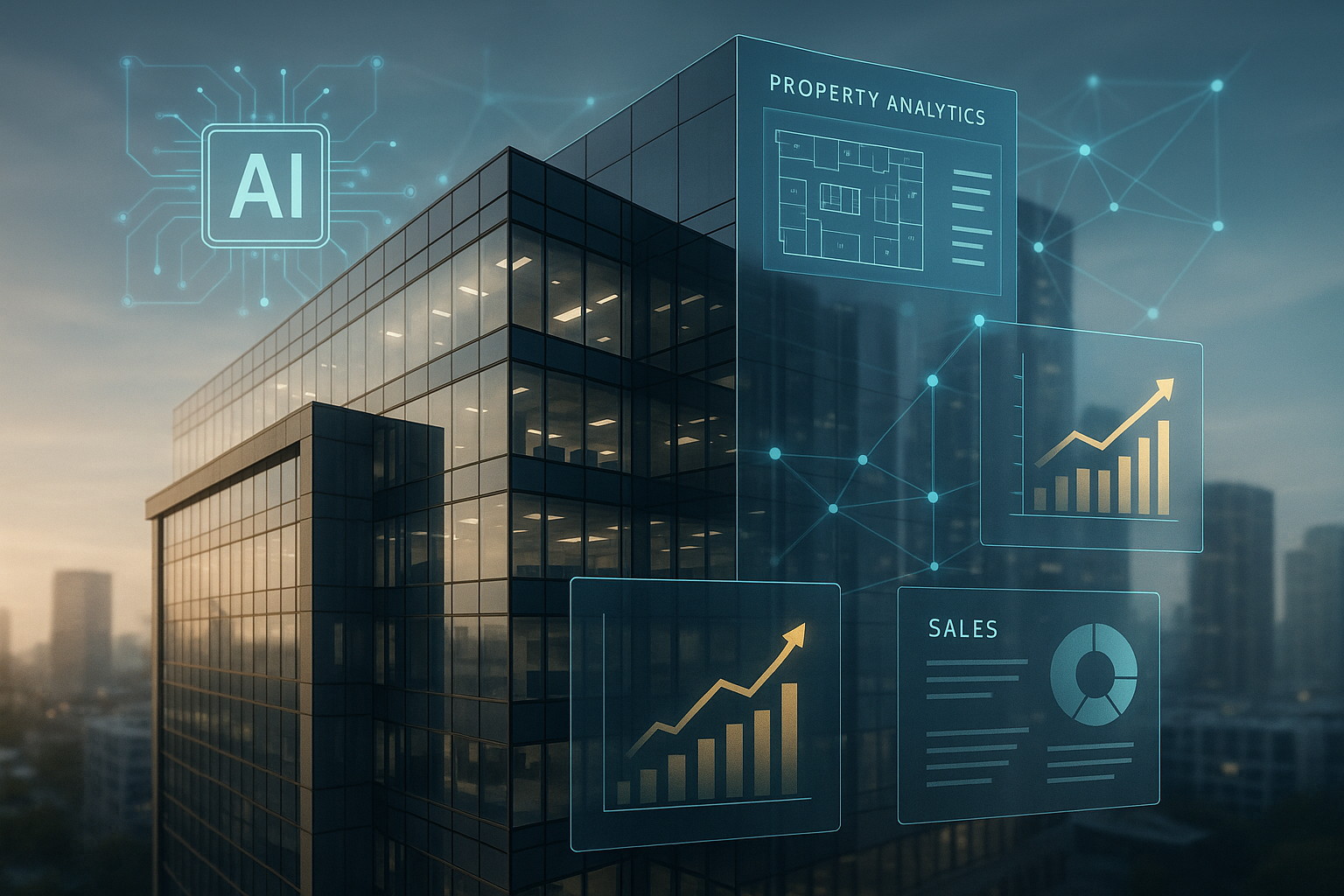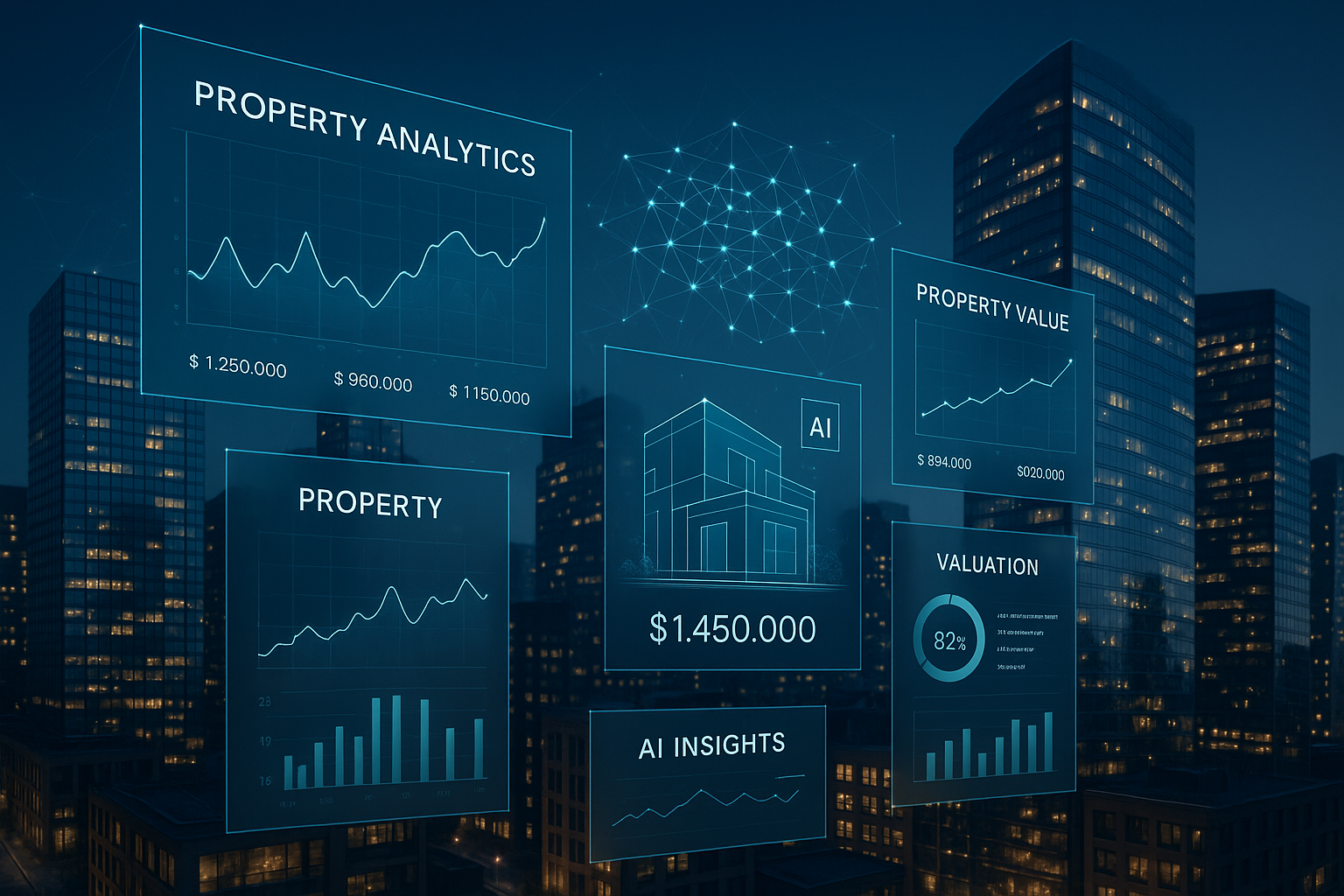
AI Revolution in Real Estate: How Artificial Intelligence is Transforming Property Markets in 2025
Caiyman.ai Research Team
AI Solutions Architect
The real estate industry is experiencing its most dramatic transformation in decades, powered by artificial intelligence. What started as experimental technology has rapidly evolved into mission-critical infrastructure, with the global AI real estate market valued at $2.9 billion in 2024 and projected to skyrocket to $41.5 billion by 2033 at an impressive 30.5% compound annual growth rate.
The $41.5 Billion AI Revolution Transforming Real Estate
The numbers tell a compelling story of rapid adoption and investment confidence. Venture capital investments in AI-powered PropTech companies reached a record-breaking $3.2 billion in 2024, highlighting the growing reliance on cutting-edge technology to address challenges across real estate verticals. This isn't just speculative investment—it's driven by measurable results and operational improvements that early adopters are already experiencing.
AI has transitioned from a futuristic promise to an essential operational tool. From predictive analytics to tenant engagement, the technology is reshaping how properties are bought, sold, managed, and valued. Morgan Stanley projects $34 billion in efficiency gains by 2030 as AI continues to transform the industry landscape.
For real estate professionals, this transformation presents both unprecedented opportunities and competitive pressures. Those who embrace AI-powered solutions early gain significant advantages in efficiency, accuracy, and client satisfaction, while those who delay risk being left behind in an increasingly tech-savvy marketplace.
Core AI Applications Revolutionizing Real Estate Operations
AI's impact on real estate spans multiple critical functions, each delivering measurable improvements over traditional methods. The most significant applications are transforming how properties are valued, managed, and traded.
Automated Valuation Models (AVMs) represent one of the most mature AI applications, consistently outperforming traditional methods with machine learning models achieving median error rates of 2-4%, compared to 5-6% for conventional approaches. Investment analysis tools powered by AI are delivering 23% higher returns compared to conventional approaches, while AI-powered due diligence automation is reducing transaction times and increasing accuracy across the board.
Property management systems enhanced with AI are cutting operational costs by 18-30% while boosting rental yields by up to 8%. These systems automate routine tasks like rent collection, maintenance scheduling, and tenant communications, freeing property managers to focus on strategic initiatives and relationship building.
Automated Property Valuation: Precision at Scale
Machine learning models are revolutionizing property valuation by capturing non-linearity and feature interactions that traditional methods often miss. These models integrate hedonic pricing theory—which determines property values based on attributes like location, size, and amenities—with advanced algorithms that can process vast amounts of market data in real-time.
AI-powered AVMs reduce valuation discrepancies by 20% in volatile markets, providing crucial stability for lending decisions and investment analysis. Major industry players are using Support Vector Machines and Neural Networks for price prediction, enabling appraisal accuracy rates up to 95% with significantly faster decision-making timelines.
The technology removes human bias and subjectivity from the valuation process, providing consistent, data-driven assessments that align with current market conditions. This objectivity is particularly valuable in commercial real estate, where complex property characteristics and market factors can make traditional valuations challenging and time-consuming.
Smart Property Management: From Reactive to Predictive
AI is transforming property management from a reactive service model to a predictive, proactive approach. AI-powered systems automate routine tasks like rent collection, lease renewals, and maintenance requests, saving time and reducing costs for property managers.
Predictive maintenance systems analyze patterns in equipment performance, tenant requests, and environmental factors to identify potential issues before they become costly repairs. This approach not only reduces maintenance costs but also improves tenant satisfaction by addressing problems proactively.
AI chatbots are enhancing the tenant experience by providing 24/7 support, instant responses to common inquiries, and seamless integration with maintenance request systems. These tools can handle routine communications while escalating complex issues to human property managers, ensuring optimal resource allocation.
Leading AI Platforms and Tools: A Comprehensive Comparison
The AI real estate technology landscape offers diverse solutions tailored to specific needs and budgets. Understanding the capabilities and pricing of leading platforms helps real estate professionals make informed decisions about their technology investments.
Valuation and Analytics Platforms
HouseCanary leads the market for AI property valuation reports, starting at $16 per month for one user. The platform offers accurate property valuation, market movement tracking, risk assessment and forecasting, and includes an AI-powered ChatGPT-style assistant. Two custom valuation reports are included in the basic plan, making it accessible for individual agents and small teams.
CoreLogic provides comprehensive property data and advanced analytics starting at $149 per month, positioning itself as an enterprise-level solution for larger organizations requiring extensive market data and trend analysis capabilities.
Zillow's Zestimate offers consumer-focused automated valuation with broad market reach, leveraging AI to generate home valuations, interactive floor plans, and search personalization. While offering wider audience reach than specialized tools, it's generally considered less precise for professional use cases.
Opendoor represents a unique category as an iBuyer platform that employs AI to value homes and make real-time offers, differing from valuation-only tools by actually executing transactions. This makes it particularly valuable for sellers seeking fast closings and firms analyzing iBuyer market trends.
Skyline AI analyzes thousands of property data points to identify high-potential real estate investments, while Reonomy specializes in commercial property intelligence for off-market opportunity identification, making it ideal for commercial real estate brokers, lenders, and investors.
Property Management AI Solutions
The property management sector offers robust AI solutions that streamline operations and improve tenant experiences. AppFolio and Buildium use AI to optimize tenant engagement, automate maintenance, and reduce human error in billing and contracts.
Yardi Virtuoso and RealPage Lumina offer AI-powered operational dashboards designed for large portfolios, providing comprehensive management capabilities across multiple properties. These platforms integrate maintenance scheduling, tenant communications, and financial reporting into unified systems.
Specialized AI assistants like Zuma's "Kelsey" AI, Entrata's ELI+, and AppFolio's Smart Maintenance demonstrate the automation of repetitive administrative tasks such as scheduling and lease management. These tools can handle routine inquiries, process maintenance requests, and manage lease renewal communications.
Implementation Strategies: Best Practices for AI Adoption
Successful AI implementation requires strategic planning and a focus on augmenting human capabilities rather than replacing them. Seven essential AI workflows for real estate professionals include automated property listing creation, personalized client recommendations, competitive market analysis reports, open house follow-up automation, neighborhood guide generation, automated client education content, and AI chatbot lead qualification.
The key to successful implementation lies in viewing AI as a tool for augmenting expertise rather than replacing it. AI should handle repetitive, data-intensive tasks while humans focus on relationship building, negotiation, creative marketing, and ethical oversight—areas where AI lacks human nuance and emotional intelligence.
Change management strategies should address job displacement concerns proactively. Organizations should communicate the benefits of AI as an augmentation tool and create clear pathways for career advancement. Training programs should focus on data literacy, prompt engineering for AI systems, interpretation of AI-generated reports, and emotional intelligence skills that remain uniquely human.
Ethical AI implementation requires prioritizing explainable AI (XAI) and transparent reporting so agents and clients can understand how AI-driven results are produced. Regular auditing of AI models for bias and accuracy is essential, with humans involved in the loop for sensitive decisions such as pricing or tenant recommendations.
Phased adoption approaches work best for organizations with legacy systems. This minimizes downtime while allowing teams to adapt gradually to new workflows. ROI measurement should track both efficiency gains and quality improvements, with clear metrics for success established before implementation begins.
Real-World Success Stories and Measurable Results
The transformative power of AI in real estate is best demonstrated through documented success stories and quantified results. An investment fund employing Natural Language Processing to scan public records acquired assets at an average of 18% below AI-estimated value, demonstrating the technology's ability to identify undervalued opportunities that human analysis might miss.
Property management companies are reporting significant improvements across multiple metrics. AI-enabled property management is boosting rental yields by up to 8% while cutting operational costs by 18-30%. These improvements come from automated rent collection, predictive maintenance, optimized pricing strategies, and enhanced tenant retention through improved service delivery.
Development projects using machine learning-assisted site selection are achieving 40% faster project sales and 12% price premiums compared to traditional market analysis methods. This demonstrates AI's ability to identify optimal locations and market timing for maximum return on investment.
Due diligence processes enhanced with AI are reducing transaction timelines by weeks rather than days. Automated document analysis, contract review, and compliance checking streamline traditionally labor-intensive processes while improving accuracy and reducing the risk of oversight.
Energy optimization and predictive maintenance systems are delivering substantial operational cost reductions. AI tools help reduce infrastructure costs through optimization of functions such as heating, ventilation, air conditioning, solar power implementation, and energy-efficiency initiatives.
C3.ai's deployment of AI-powered appraisal tools has enabled institutions to report a 12% increase in ROI through AVM deployment versus legacy valuation systems. This improvement comes from increased accuracy, faster processing times, and reduced manual labor costs.
The Future of Real Estate is AI-Powered: Are You Ready?
The exponential growth trajectory in AI real estate adoption creates both tremendous opportunities and competitive pressures. North America leads the AI real estate market with a 38.5% market share, generating over 41% of the industry's revenue in 2024, indicating strong adoption and proven ROI in developed markets.
Early adopters gain significant competitive advantages through improved efficiency, enhanced accuracy, and superior client experiences. However, the window for competitive advantage is narrowing as AI tools become more accessible and adoption accelerates across the industry.
Organizations beginning their AI journey should start with high-impact, low-complexity applications such as automated property valuation or basic chatbot implementation. These provide immediate value while building organizational confidence and expertise for more complex implementations.
The importance of balancing automation with human expertise cannot be overstated. While AI excels at data processing, pattern recognition, and routine task automation, human professionals remain essential for relationship building, complex negotiation, ethical decision-making, and providing the personal touch that clients value in real estate transactions.
Looking ahead, emerging trends in generative AI, autonomous property management, and predictive market analysis will further transform the industry. The businesses that thrive will be those that take the technological leap early, giving them an advantage in a competitive market.
Transform Your Real Estate Business with AI-Powered Solutions
The AI revolution in real estate is not a distant future scenario—it's happening now, with proven results and measurable ROI. Organizations that act quickly to implement AI solutions will gain sustainable competitive advantages, while those who delay risk falling behind in an increasingly sophisticated marketplace.
At Caiyman.ai, we specialize in implementing AI solutions for real estate professionals and organizations. Our expertise spans automated valuation systems, property management optimization, investment analysis tools, and workflow automation—helping you achieve measurable results like the success stories featured throughout this article. From reducing operational costs by 18-30% to improving valuation accuracy by achieving 2-4% error rates, we help real estate professionals harness the full power of AI to transform their business operations and client experiences.
Sources
- AI-Powered Proptech: Venture Capital Investment Trends in 2024 - CRETI
- AI in Real Estate: Key Statistics, Market Trends, and Future Growth - ArtSmart AI
- How AI Is Changing the Real Estate Industry in 2025 - ScrumLaunch
- 10 Proptech Trends in 2025: Digital Acceleration in Real Estate - Netguru
- 15 Best AI Agents for Real Estate You Should Know in 2025 - DesignVeloper
- 20 Indispensable AI Tools for Real Estate Agents - Housing Wire
- Real Estate Agents Thrive With Agentic AI: 7 Powerful Workflows - WP AI Workflow Automation
- How AI Is Reshaping Real Estate - Morgan Stanley
Share this article
Related Articles

How AI is Democratizing Real Estate: The PropTech Revolution Making Investing Accessible to Everyone
Discover how AI is breaking down traditional barriers in real estate investing, making sophisticated market analysis and property management tools accessible to everyday investors through innovative PropTech solutions.

AI Sales Agents Transform Real Estate: $4M Uniti AI Funding Signals Industry Revolution
Uniti AI's $4M funding signals a major shift toward AI-powered sales agents in real estate, promising to automate 37% of CRE tasks and deliver $34 billion in efficiency gains by 2030.

Domain-Specific LLMs in Real Estate: How Real-GPT and AI Are Transforming Property Valuation
Discover how purpose-built LLMs like Real-GPT are revolutionizing property valuation, investment analysis, and compliance in real estate through explainable AI and advanced automation.